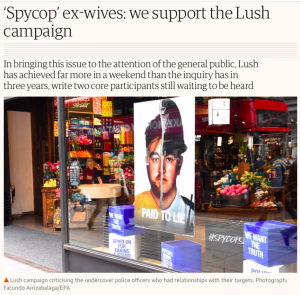
INSTITUTIONALISED SEXISM IN THE POLICE
The systemic cultural issues of misogyny and sexism within the Metropolitan Police and other constabularies have become front page news in recent years. The actions of the spycops prove that this issue has been running rampant for decades. Institutionalised sexism is at the heart of these abusive police deployments. Raising awareness of what this means and how it functions is a key element of our campaigning around this issue.
This must never happen to other women again. All abuse and mistreatment of women by police officers paid to serve them must end.
The extensive undercover policing scandal was first revealed by women who discovered their former partners were officers after they had disappeared in mysterious circumstances. The majority of undercover officers (UCOs) had deceitful relationships while undercover. These relationships shored-up the cover-stories of the officers – by definition the UCOs had no real visible background, friends or family, and by having a relationship with a trusted female activist, they would be accepted into their target groups more readily.
RELATIONSHIPS AS A TACTIC
In conceding the case to Kate Wilson, the police admitted that supervising officers had been negligent and had acted improperly in causing or allowing the relationship to happen. These were not the actions of rogue officers, but had instead been authorised or allowed to happen by the supervisory structure. This reveals a sexist mindset – that it is ok to abuse women like this in order to shore up the identity of a UCO.
Officers targeted women often as soon as they were deployed, and seemed to use the same tactics to manipulate them emotionally – faking shared interests, inventing emotionally-charged life events to gain emotional closeness to the women – and using the same techniques to leave the relationships. The women have since been able to compare their stories with each other, and the similarity of behaviour across the officers suggests they were most likely to be trained in these tactics.
“It highlights the sexist mind-set that thought that it was acceptable for the police to abuse women, and derail our lives in order to shore up the fake identities of these undercover policemen so they could undermine political movements and campaign groups.” Helen Steel
“This is not about a need to do it. It is about a desire to do it. They have the power and they think they can get away with it. That is what it is about.” Helen Steel
SEXISM IN THE ESTABLISHMENT
The chair of the public inquiry Sir John Mitting is a member of the Garrick Club which until very recently has been a men-only institution. There is consensus among those affected that Sir John lacks understanding around issues of sex discrimination; he was described by Phillippa Kaufmann QC as “the usual white, upper middle-class, elderly gentleman whose life experiences are a million miles away from those who were spied upon”.
We are campaigning for a panel of advisors to be appointed with knowledge and understanding of how sex, race and class discrimination functions and impacts both in relation to individuals and institutions.
The women also faced sexism when they gave evidence to the Home Affairs Select Committee on undercover policing.
“We were asked what we had done, we were almost expected to prove our innocence. They repeatedly asked a senior officer who also gave evidence the same day as us to apologise for the use of the identities of dead children, but they never once asked her to apologise to us. There was definitely an assumption of guilt, that we must have brought this on ourselves, and that is actually the same attitude that blames violence against women on what we are wearing, or where we are walking, rather than on the men that perpetrate that violence.” Helen Steel
The CPS has also demonstrated sexism in their approach to the women. They declined to prosecute the officers for sexual assault, or even misconduct in public officer, stating the relationships were based on “genuine feelings of mutual attraction”. That response is utterly inappropriate, without basis and insulting to the women concerned. Consent was clearly negated by the level of deception, not simply as to who they were, but as to the purpose of these relationships. The fact that the CPS believes women can consent to a relationship with a paid, crown servant using a false identity to spy on them is extremely disturbing. Legislation about consent is outdated and no longer fit for purpose. Sex by deception is, in our view, a crime and new legislation must recognise this.
OFFICERS’ WIVES
There is a total disregard for the officers wives shown in their deployment and management. The officers were generally required to have wives and families to become UCOs. This was to ensure they had something to go back to after their “assignment” ended.
The fact that these exploitative relationships were either allowed or authorised by those in command, shows an utter disregard for the lives of both the activist women and the wives.
Only one undercover officer’s wife has participated in the Undercover Policing Inquiry. She was married to Mark ‘Cassidy’ Jenner and is known by the cipher ‘S’. She gave evidence to the Inquiry on December 9th 2025. Her Opening Statement is available to read here. The transcript of her oral evidence is yet to be published.
SIGNIFICANCE OF PUBLIC INQUIRY
The Metropolitan Police have said that their attitudes may have been wrong in their apology to the women in the first case, and have acknowledged in their opening statement to Tranche 2 of the Inquiry there has been sexism and misogyny in the force.
“Relationships like these should never have happened. They were wrong and were a gross violation of personal dignity and integrity. … it may well have reflected attitudes towards women that should have no part in the culture of the Metropolitan Police.” Assistant Commissioner Martin Hewitt
If the final report of the Public Inquiry into Undercover Policing does not officially recognise this institutionalised sexism – nothing will change. Sir John Mitting’s Interim Report (June 2023) states consideration of this will be made in the final report. We have seen the power of the McPherson Inquiry recognising racism in the Met. This is what is needed here if we are to have any chance of real change and to stop women’s lives being abused like this in the future.
WHAT YOU CAN DO
Public outrage at the police’s abuse of women in this way is critical to forcing the establishment to implement changes. Get talking and writing about these issues to help us force changes in this sexist mindset.




